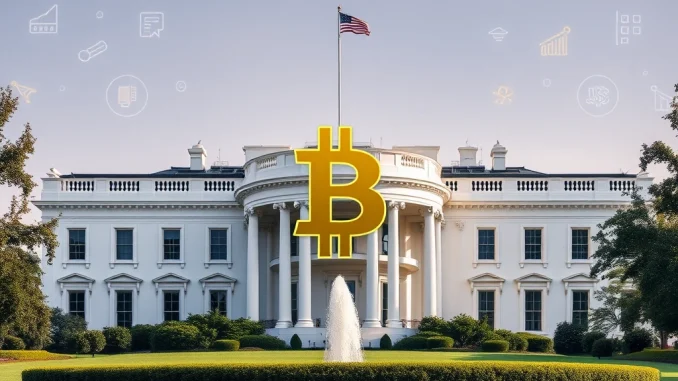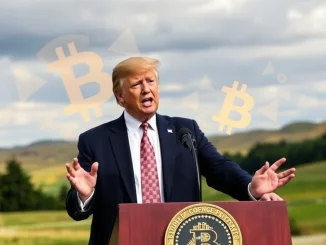
Buckle up, crypto enthusiasts! The latest buzz from Washington could redefine how governments engage with Bitcoin. Imagine the U.S. government strategically amassing Bitcoin, not through taxpayer money, but through… tariffs? Sounds like something straight out of a crypto dream, right? Well, according to a top White House advisor, this might just become reality. Let’s dive into this fascinating development and explore what it could mean for the future of Bitcoin and the global financial landscape.
Could Tariffs Become the Secret Weapon for U.S. Bitcoin Acquisition?
Bo Hines, a key figure on the White House’s President’s Council of Advisers on Digital Assets, dropped a bombshell in a recent interview with Anthony Pompliano. He revealed that the U.S. administration is seriously exploring innovative, budget-neutral strategies to accumulate Bitcoin (BTC). The most intriguing part? The potential use of tariffs to fund this Bitcoin buying spree. This isn’t just idle chatter; Hines emphasized that a team of “high IQ individuals” is meticulously examining all avenues to make this happen without impacting the average American taxpayer. This bold approach signals a significant shift in how governments might perceive and interact with digital assets like Bitcoin.
Why is the U.S. Government Eyeing Bitcoin?
The reasons behind the U.S. government’s growing interest in Bitcoin are multifaceted and reflect the evolving role of digital assets in the global economy. Here’s a breakdown of the potential motivations:
- Strategic Asset Diversification: Just as nations hold gold reserves, Bitcoin is increasingly seen as a strategic digital asset. Diversifying national reserves with Bitcoin could hedge against inflation and the volatility of traditional financial markets.
- Technological Leadership: Embracing Bitcoin and blockchain technology positions the U.S. at the forefront of the digital revolution. Accumulating Bitcoin could be seen as a move to maintain technological and financial leadership in the digital age.
- Economic Innovation: Bitcoin and the broader cryptocurrency ecosystem are hubs of innovation. Government involvement could foster further development and adoption of blockchain technologies within the U.S.
- Future-Proofing Finances: As the world becomes increasingly digital, having a stake in decentralized digital currencies like Bitcoin could be a prudent step to future-proof the nation’s finances.
How Could Tariffs Facilitate Bitcoin Acquisition?
The idea of using tariffs to buy Bitcoin might sound unconventional, but the mechanism is relatively straightforward. Here’s how it could work:
- Tariff Revenue Generation: The U.S. government collects revenue through tariffs imposed on imported goods.
- Budget-Neutral Allocation: Instead of this tariff revenue going into the general government fund, a portion could be specifically allocated to purchase Bitcoin.
- Strategic Bitcoin Reserve: This dedicated revenue stream allows for Bitcoin accumulation without increasing taxes or reallocating funds from existing public services – hence, “budget-neutral.”
This approach allows the government to tap into an existing revenue source to build a strategic reserve of digital assets, specifically BTC, without directly impacting taxpayers’ wallets.
Exploring All Options: What Does “No Stone Unturned” Mean?
Hines’ statement that “no stone is unturned” suggests a comprehensive and open-minded approach within the White House regarding Bitcoin acquisition. This could encompass a range of strategies beyond just tariffs. What other “budget-neutral” options might be on the table?
- Seized Cryptocurrency: Governments agencies like the FBI and IRS seize cryptocurrencies from illegal activities. Allocating a portion of these seized assets to a national Bitcoin reserve could be another budget-neutral method.
- Mining Revenue (Hypothetical): While less likely in the U.S. context due to energy concerns, in theory, a government could invest in Bitcoin mining operations and use the mined Bitcoin for reserves. This would generate new Bitcoin rather than using existing funds.
- Strategic Partnerships: Collaborations with private sector entities or even other Bitcoin-friendly nations could lead to innovative, budget-neutral acquisition strategies.
The “no stone unturned” mantra indicates a proactive and exploratory phase, suggesting the U.S. government is serious about finding the most effective and least burdensome ways to engage with Bitcoin.
Challenges and Considerations
While the prospect of the U.S. government acquiring Bitcoin through tariffs is exciting, there are challenges and considerations to keep in mind:
| Challenge | Consideration |
|---|---|
| Market Impact: | Large-scale government Bitcoin purchases could significantly impact market prices and volatility. Strategies would need to be implemented carefully to avoid market disruption. |
| Regulatory Scrutiny: | Government involvement in Bitcoin, especially using tariff revenue, will likely face intense regulatory and public scrutiny. Transparency and clear legal frameworks will be crucial. |
| Geopolitical Implications: | A U.S. move into Bitcoin could trigger similar actions from other nations, leading to a global race for digital asset accumulation with potential geopolitical ramifications. |
| Public Perception: | Educating the public about the rationale behind government Bitcoin acquisition and ensuring transparency will be vital to garner public support and avoid misinterpretations. |
The Bottom Line: A Bold Step into the Bitcoin Era?
The White House’s exploration of using tariffs to acquire Bitcoin marks a potentially transformative moment in the relationship between governments and cryptocurrencies. It signals a growing recognition of Bitcoin’s strategic importance and a willingness to explore unconventional methods to engage with this burgeoning asset class. While challenges remain, the commitment to finding budget-neutral solutions and leaving “no stone unturned” underscores a serious and strategic approach from the U.S. government. Keep your eyes peeled – this story is just getting started, and it could have profound implications for the future of finance and the role of Bitcoin on the global stage.



